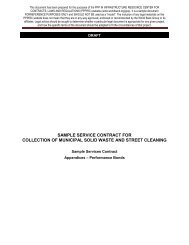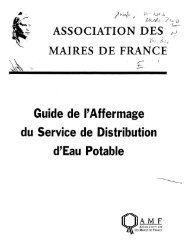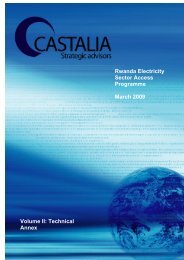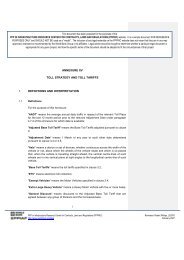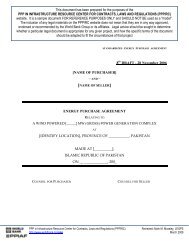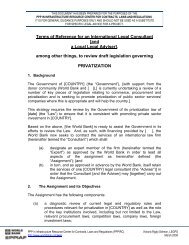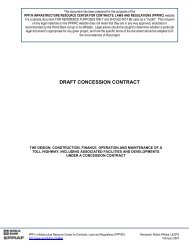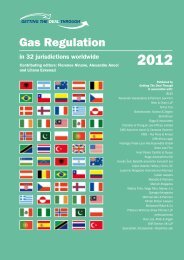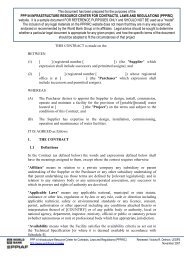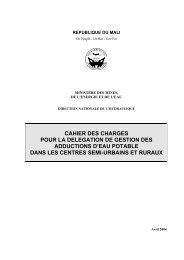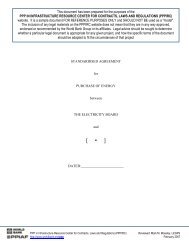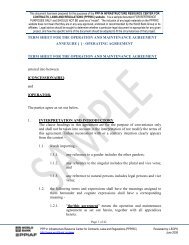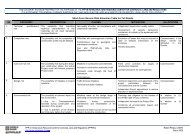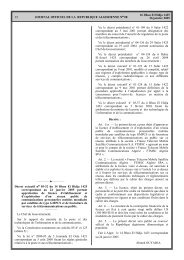Volume I: Investment Prospectus Rwanda Electricity Sector Access ...
Volume I: Investment Prospectus Rwanda Electricity Sector Access ...
Volume I: Investment Prospectus Rwanda Electricity Sector Access ...
- No tags were found...
Create successful ePaper yourself
Turn your PDF publications into a flip-book with our unique Google optimized e-Paper software.
• Presidential priorities for electrification.Each attribute receives a weight according to its relative significance in determining the likelycosts and benefits of electrification. The total score for each sublocation is then used to rankthe planning cells relative to each other. Cells that receive the highest scores are prioritisedfor electrification in the access programme, according to a realistic assessment of the numberof new connections that can be achieved in each year. As discussed in Box 4.2 (below), whilea detailed economic assessment of the costs and benefits of extending coverage to differentcells is not possible at this time, the prioritisation approach used to plan the accessprogramme captures many of the elements that will form part of the more detailed projectcost-benefit analysis.Box 4.2: Calculating the Economic Impact of <strong>Rwanda</strong>’s ElectrificationProgrammeThe methodology applied in this <strong>Prospectus</strong> to plan <strong>Rwanda</strong>’s electricity accessprogramme prioritises the extension of electricity to planning cells by allocating scores to arange of economic and technical characteristics. This approach captures many of theelements that would form part of a project cost-benefit analysis—higher populationdensities, proximity to the network and access to roads will all tend to lower the costs ofthe programme. Prioritising cells with more unelectrified households, social institutions,and economic activity will tend to increase the economic benefits of the programme.In addition, a preliminary assessment of the overall economic costs and benefits of theprogramme has been completed. This analysis uses the estimated capital and operatingcosts of providing supply to new customers discussed in detail in Section 5 of this<strong>Prospectus</strong>. The economic benefits of the access programme are more difficult to quantify.This analysis of economic benefits considers direct benefits only, which are reflected in thewillingness of customers to pay for electricity. This is a relatively conservative approach tocost-benefit analysis, and the true benefits of the access programme are expected to bebroader by enabling other economic activity to take place, such as complementaryimprovements in other infrastructure sectors.There is currently no study of willingness to pay for electricity in <strong>Rwanda</strong>, althoughprevious estimates of willingness to pay in rural communities made by ESMAP 15 rangefrom between US$0.50c/kWh and US$0.70c/kWh. 16 These willingness to pay studies arebased on households receiving the following benefits:• Less expensive and expanded use of lighting• Less expensive and expanded use of radio and television• Improved returns on education and wage income• Time savings for household chores• Improved productivity of home businesses.These estimated economic benefits are expected to accrue to <strong>Rwanda</strong>n households as adirect consequence of the access programme and are likely to be higher than long runmarginal costs of supply in <strong>Rwanda</strong>. This means that the programme will have neteconomic benefits.15 ESMAP. “Rural electrification and development in the Philippines: Measuring the social and economic benefits.” InReport 255/02, Washington, D.C. 2002.16 International Energy Group (IEG) “The Welfare Impact of Rural Electrification: A Reassessment of the Costs andBenefits” IEG Impact Evaluation, 2008. For conclusions see:http://web.worldbank.org/WBSITE/EXTERNAL/EXTOED/EXTRURELECT/0,,contentMDK:21604879~menuPK:4489096~pagePK:64829573~piPK:64829550~theSitePK:4489015~isCURL:Y,00.html25



